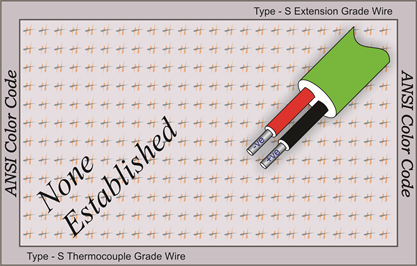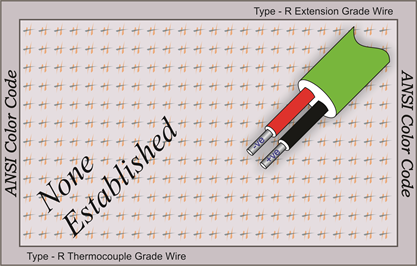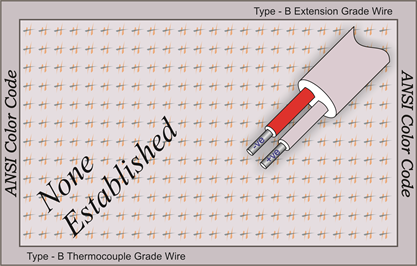Sheath Material
|
Sheath Type
|
Maximum Temp (°C)
|
Melting Temp (°C)
|
Allowable Environment
|
Standard Sheath Diameter (inches)
|
Minimum Bend Radius
|
|
Inconel 600
|
1175
|
1345
|
Inert, Vacuum, Oxidizing
|
0.040, 0.062, 0.125, 0.188, 0.250
|
5X Sheath Diameter
|
|
Platinum 10% Rhodium
|
1550
|
1850
|
Inert, Oxidizing
|
0.040, 0.062, 0.125
|
5X Sheath Diameter
|
|
Tantalum
|
2200
|
2995
|
Inert, Vacuum
|
0.040, 0.062, 0.125
|
10X Sheath Diameter
|
|
Niobium 1% Zirconium
|
2200
|
2495
|
Inert, Vacuum
|
0.062, 0.125
|
10X Sheath Diameter
|
|
Molybdenum
|
2000
|
2620
|
Inert, Vacuum, Reducing
|
0.062, 0.125, 0.188, 0.250
|
Do Not Bend
|
|
Coated Molybdenum
|
1600
|
2000
|
Inert, Oxidizing
|
0.125, 0.250
|
Do Not Bend
|
Available Types
|
Thermocouple Combinations
|
Calibration Type
|
Standard Limits Of Error
|
Recommended Temperature Range
|
|
Platinum 30% Rhodium (+) Vs. Platinum 6% Rhodium (-)
|
B
|
± 0.5%
|
870 - 1700 °C
|
|
Tungsten 5% Rhenium (+) Vs. Tungsten 26% Rhenium (-)
|
C
|
± 4.4 °C (0 - 426 °C)*
|
0 - 2200 °C
|
|
± 1% (426 - 2315 °C)*
|
|
Tungsten 3% Rhenium (+) Vs. Tungsten 25% Rhenium (-)
|
D
|
± 4.4 °C (0 - 426 °C)*
|
0 - 2200 °C
|
|
± 1% (426 - 2315 °C)*
|
|
Platinum 13% Rhodium (+) Vs. Platinum
|
R
|
± 1.5 °C or 0.25% **
|
0 - 1450 °C
|
|
Platinum 10% Rhodium (+) Vs. Platinum
|
S
|
± 1.5 °C or 0.25% **
|
0 - 1450 °C
|
*Per ASTM E-988
**Per ASTM E-230
Type S Thermocouple (Platinum Rhodium - 10% / Platinum): The Type
S is used in very high temperature applications. It is commonly found in the Biotech
and Pharmaceutical industries. It is sometimes used in lower temperature applications
because of its high accuracy and stability.
Temperature Range:
•Type S Thermocouple Grade Wire Thermocouple grade wire, -58 to 2700F (-50 to 1480C)
•Extension wire, 32 to 392F (0 to 200C)
Accuracy (whichever is greater):
•Standard: +/- 1.5C or +/- .25%
•Special Limits of Error: +/- 0.6C or 0.1%

Type R Thermocouple (Platinum Rhodium -13% / Platinum): The Type
R is used in very high temperature applications. It has a higher percentage of Rhodium
than the Type S, which makes it more expensive. The Type R is very similar to the
Type S in terms of performance. It is sometimes used in lower temperature applications
because of its high accuracy and stability.
Temperature Range:
•Type R Thermocouple Grade Wire Thermocouple grade wire, -58 to 2700F (-50 to 1480C)
•Extension wire, 32 to 392F (0 to 200C)
Accuracy (whichever is greater):
•Standard: +/- 1.5C or +/- .25%
•Special Limits of Error: +/- 0.6C or 0.1%

Type B Thermocouple (Platinum Rhodium – 30% / Platinum Rhodium – 6%):
The Type B thermocouple is used in extremely high temperature applications. It has
the highest temperature limit of all of the thermocouples listed above. It maintains
a high level of accuracy and stability at very high temperatures.
Temperature Range:
•Type B Thermocouple Grade Wire Thermocouple grade wire, 32 to 3100F (0 to 1700C)
•Extension wire, 32 to 212F (0 to 100C)
Accuracy (whichever is greater):
•Standard: +/- 0.5%
•Special Limits of Error: +/- 0.25%

Insulating Material
|
Insulation Type
|
Maximum Operating Temp (°C)
|
Approximate Melting Temp (°C)
|
Comments
|
|
Magnesia (MgO)
|
1700
|
2800
|
Very hydroscopic. Used mostly in compacted sheaths.
|
|
Alumina Oxide (Al²O³)
|
1550
|
2040
|
Excellent with Platinum alloys.
|
|
Hafnium Oxide (HfO²)
|
2200
|
2790
|
Comparable to Beryllium Oxide and safe to handle.
|
|
Beryllium Oxide (BeO)***
|
2200
|
2650
|
Excellent High Temperature thermal conductivity and resistivity.
|
***Beryllium is considered a toxic material and can cause health problems if particles
are inhaled.